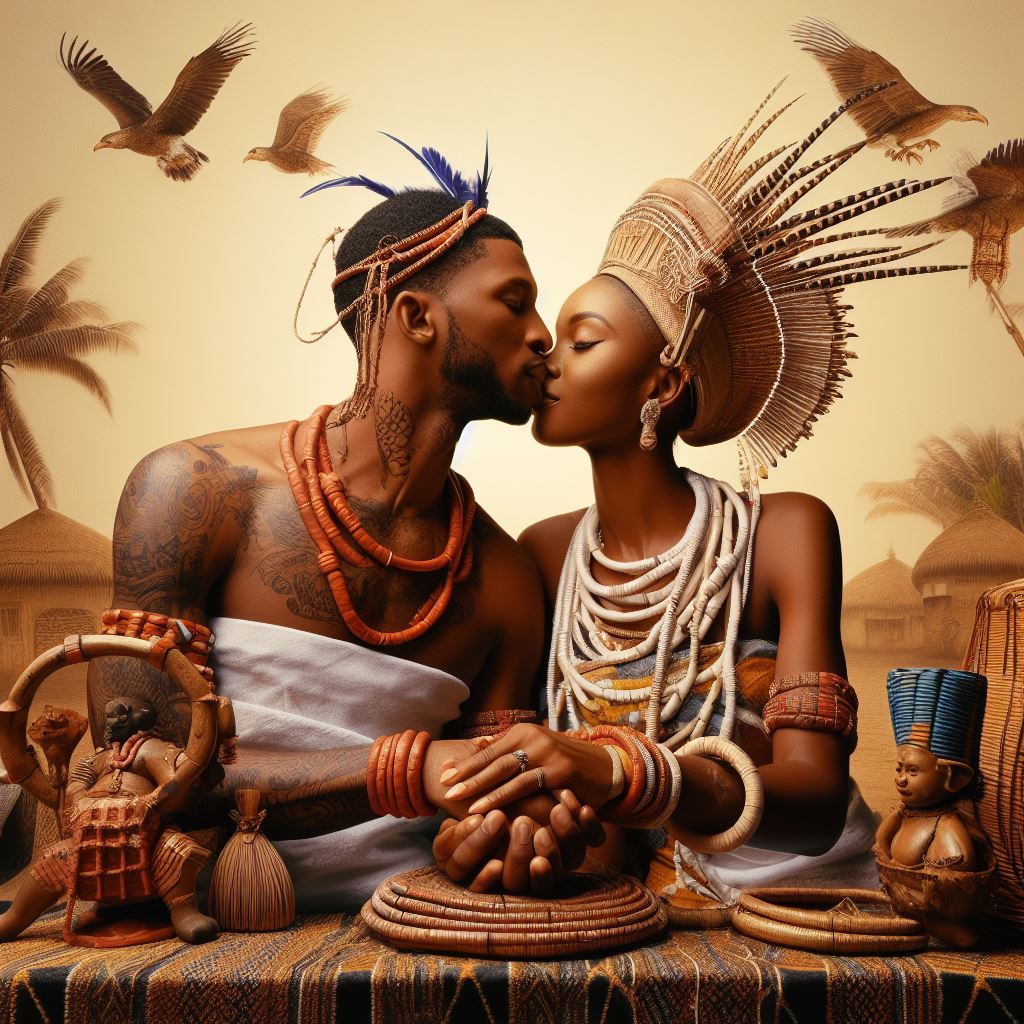Marriage is Honourable: Understanding its Roots in Nigerian Culture
Last Updated on January 28, 2024
Introduction
Marriage in Nigerian Culture holds significant cultural value, and understanding its roots is crucial.
This blog post will explore the importance of comprehending Nigerian marriage customs and traditions.
The following main points will be discussed:
- Historical Significance: The institution of marriage in Nigeria has deep historical roots, with customs dating back centuries. Recognizing these origins is essential for appreciating its current significance.
- Cultural Significance: Marriage is highly regarded in Nigerian culture, representing the unity of families and communities. Understanding its roots allows for a deeper understanding of the values and beliefs associated with this esteemed institution.
- Traditional Practices: Nigerian marriage traditions are diverse and varied across different ethnic groups. By delving into these customs, we can gain insight into the unique rituals, ceremonies, and symbols that shape Nigerian weddings.
- Family Involvement: Family plays a pivotal role in Nigerian marriages, with the involvement of both immediate and extended family members. This section will explore the significance of family support and their active participation in the marriage process.
- Gender Dynamics: Examining the roots of marriage in Nigerian culture sheds light on the traditional roles and expectations placed on men and women. Insights into gender dynamics and the changing dynamics in modern Nigeria will be discussed.
- Contemporary Influences: Lastly, this chapter will address the impact of globalization and modernization on Nigerian marriage customs. By understanding the roots, we can appreciate how marriage in Nigeria has adapted and evolved over time.
In essence, gaining a deeper understanding of the roots of marriage in Nigerian culture allows us to appreciate the value it holds in society.
Exploring the historical, cultural, and traditional aspects provides insight into the significance of this beloved institution.
Historical Background
- Marriage has always held great significance in Nigerian culture, representing a union between families and tribes.
- Traditional customs such as dowry payment, bride price negotiations, and elaborate marriage ceremonies have been integral parts of Nigerian marriages.
- Marriage was not merely a personal choice but a way to uphold social harmony, strengthen alliances, and ensure the continuity of lineage.
- Colonialism brought about significant changes, impacting Nigerian marriages as Western norms and values were imposed.
- With Westernization, Nigerian marriages began to see a decline in traditional customs, replaced by more modern and individualistic approaches.
- Interfaith marriages and interracial unions have become more accepted in recent times, showcasing the transformation of Nigerian marriage practices.
Historical significance of marriage in Nigerian culture
- Marriage served as a tool for consolidating power, building wealth, and reinforcing social structures.
- It played a crucial role in preserving traditions, customs, and cultural values, ensuring their continuity over generations.
- Through marriage, individuals gained social status, respect, and recognition within their communities.
- Arranged marriages were common, emphasizing the importance of family consent and involvement in choosing a partner.
- Marriage was seen as a sacred institution with deep spiritual and religious undertones, symbolizing unity and fertility.
Traditional customs and rituals associated with marriage
- Dowry payment, where the groom presents gifts or payment to the bride’s family, represented a way to compensate for the loss of a daughter.
- Bride price negotiations, involving the groom’s family giving gifts and money to the bride’s family, were essential for the marriage to be considered valid.
- Elaborate wedding ceremonies featuring traditional attires, dances, and feasts brought communities together and showcased cultural heritage.
- Coming-of-age ceremonies and pre-marital counseling were conducted to prepare individuals for their roles as spouses and parents.
Influence of colonialism and Westernization on Nigerian marriages
- During colonial rule, Western concepts of monogamy, gender roles, and nuclear families were introduced, challenging traditional polygamous practices.
- Christianity and Western education brought a shift towards individualism, emphasizing love and compatibility in choosing a partner.
- Christian wedding ceremonies gained popularity, blending traditional customs with Christian rites.
- The influence of Western media and globalization has resulted in the adoption of more Western wedding practices, such as white wedding gowns and diamond engagement rings.
- However, some traditional customs, like respect for elders and family involvement, remain integral to Nigerian marriages despite Western influences.
Traditional Beliefs and Values
- Exploring the traditional beliefs and values that emphasize the honor of marriage in Nigeria.
- Unity, respect, and family values are highly emphasized in marriages in Nigeria.
- The influence of religion and spirituality plays a significant role in shaping the concept of marriage.
Exploring the traditional beliefs and values that emphasize the honor of marriage in Nigeria
Nigerian culture considers marriage a sacred institution, deeply rooted in traditional beliefs and values. They see it as a union blessed by the ancestors and the divine.
In Nigeria, people highly emphasize the honor of marriage, and various traditional beliefs and values shape this perception.
One of the core beliefs that underscores the honor of marriage in Nigeria is the emphasis on unity.
People view marriages as the unification of two families, bringing together not only the bride and the groom but also their respective families.
Emphasis on unity, respect, and family values in marriages
This emphasis on unity motivates family members to form and sustain strong bonds and connections, viewing marriage as a means to forge and maintain these relationships.
Nigerian culture deeply ingrains another key value, which is respect, and this is evident in the institution of marriage.
Within the marriage, husbands and wives should respect and honor each other, while fulfilling their respective roles and responsibilities.
Mutual respect forms the foundation of a successful marriage, ensuring harmony and stability within the union.
Familial values also play a vital role in shaping the concept of marriage in Nigeria.
The institution of marriage is not only about the union between two individuals but also about the joining of two families.
Family values, such as support, loyalty, and cooperation, are highly regarded, ensuring that marriages are built on a solid foundation.
The extended family plays an active role in the couple’s lives, offering guidance and assistance whenever needed.
Influence of religion and spirituality plays a significant role in shaping the concept of marriage
Furthermore, alongside traditional beliefs and values, religion and spirituality significantly impact the concept of marriage in Nigeria.
This country, known for its diverse religious practices, encompasses Christianity, Islam, and traditional indigenous religions.
These diverse belief systems each offer their own distinctive viewpoints on marriage, and they all stress the sanctity and honor of the union.
For instance, Christianity, as a primary religious influence, teaches that marriage constitutes a sacred covenant ordained by God between a man and a woman.
It underscores the importance of love, fidelity, and commitment in a marital relationship.
Similarly, Islamic teachings promote the idea that marriage serves as a means of achieving spiritual growth, encouraging spouses to support and care for each other as they strive for righteousness.
Moreover, traditional indigenous religions within Nigeria also have their unique beliefs and practices concerning marriage.
Which encompass ceremonies and rituals symbolizing the union of two individuals and their families. These ceremonies are perceived as a way to seek the blessings and protection of the ancestors.
In essence, Nigerian culture holds marriage in high regard because of its foundations in traditional beliefs and values.
The emphasis on unity, respect, and family values, combined with the influence of religion and spirituality, collectively contribute to the perception of marriage as a sacred and honorable institution.
Ultimately, comprehending these roots is paramount for truly appreciating the significance and cultural context of marriage in Nigeria.
Read: Insider Tips: Navigating the Marriage Form Process Effortlessly
Roles and Responsibilities
Gender Roles and Responsibilities within Nigerian Marriages
- Traditional Nigerian marriages have specific gender roles and responsibilities.
- Husbands are expected to be the providers and protectors of their families.
- Wives are expected to be nurturers, taking care of the home and raising children.
- These roles are deeply ingrained in Nigerian culture and are seen as essential.
- Gender roles also extend to decision-making within the marriage, with husbands typically having the final say.
Traditional Expectations of Husbands and Wives in the Marriage
- People expect husbands to financially support the family.
- People also expect husbands to provide emotional support and protect their wives.
- People expect wives to manage the household chores and take care of the children.
- People also expect wives to respect and submit to their husbands’ authority.
- Nigerian cultural values and beliefs deeply root these traditional expectations.
Changes and Adaptations in Gender Roles in Modern Nigerian Society
- In modern Nigerian society, gender roles within marriages are evolving.
- More women are pursuing careers and becoming financially independent.
- This has led to a shift in traditional expectations of husbands as sole providers.
- Women are now sharing the financial responsibility and decision-making within marriages.
- There is also a growing recognition of the importance of equal partnership and mutual respect.
In general , Nigerian marriages have long-held gender roles and responsibilities.
Husbands are seen as providers and protectors, while wives are expected to be nurturing homemakers.
However, there is a growing shift in modern Nigerian society towards more equitable gender roles and responsibilities.
Women are increasingly pursuing careers, sharing financial responsibilities, and participating in decision-making within marriages.
These changes reflect the evolving dynamics of Nigerian culture and the importance of equality and respect within marriages.
Read: The Essence of Marriage in Traditional Nigerian Cultures

Celebrations and Ceremonies
Marriage ceremonies and celebrations in Nigerian culture
- Nigerian culture boasts a wide range of marriage ceremonies and celebrations.
- The Yoruba tribe, for example, has a traditional wedding known as the “engagement” or “Introduction.”
- The bride’s family presents gifts to the groom’s family as a gesture of acceptance and goodwill.
- In the Igbo culture, the traditional wedding is called “Igba Nkwu.”
- This ceremony involves extensive family involvement and showcases the bride’s family’s wealth and hospitality.
- In the Hausa culture, the traditional marriage ceremony is called “Fatihah.”
- During this ceremony, the groom’s family brings gifts, including a dowry, to the bride’s family.
- These different ceremonies symbolize the diverse ethnic backgrounds and traditions present in Nigeria.
Traditional Wedding Rites and Customs
- The Yoruba traditional wedding involves a series of rituals and customs.
- The groom visits the bride’s family with his family members to officially ask for her hand in marriage.
- Both families exchange gifts, such as kolanuts and palm wine, as a sign of betrothal and unity.
- In Igbo traditional weddings, the bride’s family organizes the “Igba Nkwu” ceremony.
- During this ceremony, the groom is required to bring a specific number of yam tubers as a symbol of his fertility and ability to provide for his wife.
- For the Hausa traditional wedding, the “Fatihah,” the groom is expected to bring a dowry to the bride’s family.
- The dowry represents the groom’s commitment to caring for and providing for the bride.
Significance of these Ceremonies in Preserving Cultural Heritage and Customs
- Marriage ceremonies play a vital role in preserving Nigeria’s rich cultural heritage.
- These ceremonies showcase the customs, rituals, and values that have been passed down through generations.
- They provide an opportunity for families to come together and celebrate their shared heritage.
- By participating in these ceremonies, individuals reinforce their identity and connection to their respective ethnic groups.
- The ceremonies also serve as a platform for educating younger generations about their cultural traditions.
- Through these rituals, young people learn about respect for elders, family values, and the importance of community.
- The customs and traditions associated with these ceremonies serve as a reminder of the values that define Nigerian society.
Read: Cultural Influences on Nigerian Marriage Contracts
Challenges and Changes
Challenges faced by marriages in modern Nigerian society
- Economic pressures: Financial strain and unemployment can put a significant strain on marriages.
- Infidelity: Changing societal norms and increased exposure to temptations have contributed to a rise in infidelity.
- Communication breakdown: Technology, although beneficial in connecting people, can create communication gaps within marriages.
- Gender roles: As traditional gender roles evolve, couples may struggle to adapt to these changing dynamics.
- Individualism: Modern lifestyles emphasize personal fulfillment, causing some to prioritize their individual needs over the welfare of the marriage.
- Lack of support systems: With urbanization and migration, extended family networks that provided support are diminishing.
- Unrealistic expectations: Influenced by media portrayals, some couples have unrealistic expectations of marriage, leading to disappointment.
- Cultural clashes: In Nigerian society, intertribal marriages can face challenges due to cultural differences and prejudices.
Despite these challenges, marriages in Nigeria are also adapting and evolving.
- Increased emphasis on compatibility: With the changing dynamics, couples prioritize compatibility and shared values.
- Balancing tradition and modernity: Couples navigate a delicate balance between maintaining cultural traditions and embracing modern values.
- Reinventing gender roles: Marriages are becoming more egalitarian, with both partners sharing household responsibilities.
- Seeking professional help: Couples are more open to seeking therapy and counseling to work through their challenges.
- Cultivating strong support networks: Couples are also building their own support networks, consisting of friends and mentors.
- Embracing technology: Technology can create challenges, couples are also using it to enhance their relationship through communication apps and virtual dates.
- Social media as a tool: Many Nigerian couples are utilizing social media platforms to connect and share their marital experiences, offering support and advice to others.
Read: Understanding Nigerian Marriage Traditions and Rites
See Related Content: Scriptural Guidance for Handling Marital Challenges
Conclusion
We have explored the roots of marriage in Nigerian culture and have seen that it is considered honorable.
And we have discussed the various cultural traditions and customs that emphasize the importance of marriage in Nigerian society.
Understanding these roots can help us appreciate the significance and value that marriage holds in Nigerian culture.
Marriage holds significant honor in Nigerian culture and Families celebrate unions with grand ceremonies. Couples uphold traditions, symbolizing unity and commitment.
Elders impart wisdom to newlyweds, guiding their journey. Marriae strengthens communal bonds, emphasizing respect and love.
The society praises married individuals for their commitment. And Celebrations showcase Nigeria’s rich heritage. Music, dance, and attire play vital roles.
Each region boasts unique marital customs. Marriage remains a revered institution, deeply rooted in cultural values. Also, Nigerian marriages deeply root in rich traditions.
Various ethnic groups have unique customs. Igbos pay bride price, symbolizing commitment. Yorubas celebrate with vibrant dances and songs.
Hausas emphasize family involvement in match-making and these customs foster unity, respect, and love. They’re not mere ceremonies but they bind generations.
Embracing these traditions offers valuable insights. Also, Nigerian marriage rituals teach about family, values, and heritage.
Understand and appreciate these roots to truly grasp Nigerian culture’s essence. Celebrate the depth and beauty of these matrimonial customs.
So Let us cherish and honor the institution of marriage in Nigerian culture.


